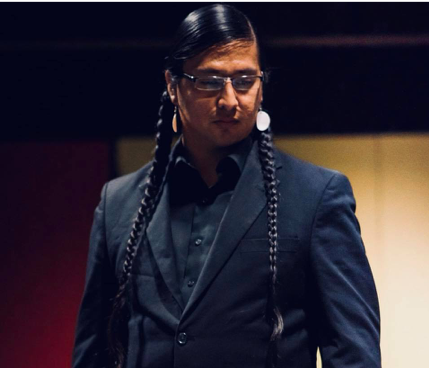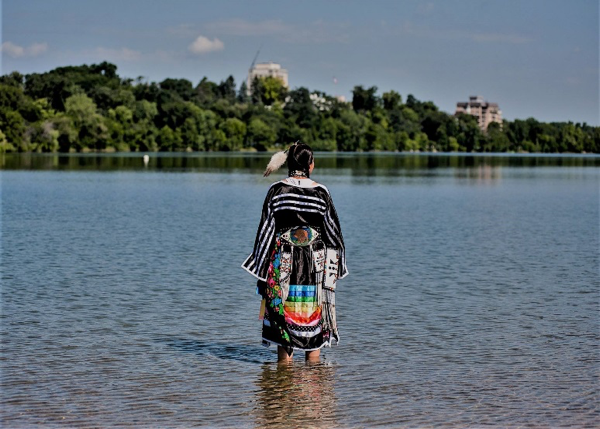
Wakinyan miye yelo Sicangu Lakota Oyate hematanhan. Lakowicoh’an waun welo.
My name is Wakinyan LaPointe, I am from the Burnt Thigh Lakota Nation. I am here to kick off a full week of blogs about youth-engaged evaluation on behalf of the Minnesota Evaluation Association, acting as the Local Arrangements Working Group (LAWG) planning for AEA 2019, which is happening in Minneapolis, MN, in November. I am looking forward to participating in the conference, and presenting about the Wopasi: Indigenous Youth Research & Development Center (Wopasi). Here I offer meaningful insights into our formative work of Wopasi and indigenous, youth-engaged research methodologies.
In 2016, indigenous peoples, youth, and partners alongside LeMoine LaPointe, Sicangu Lakota, in Mnisota envisioned the formation of an Indigenous Youth Research & Development Center for creating transformational change in the way information about indigenous youth is gathered, shared, and used. Historically, western research on indigenous peoples has propagated inequalities, disparities, and deficit-based narratives, leaving indigenous youth with a negative picture of the future.
However, indigenous peoples did not become strong, successful, and healthy nations by focusing on their deficits, but rather on their strengths, gifts, and assets; indigenous peoples explored areas for improvement, transformations of existing systems, and innovations with future generations. In contrast to western society, indigenous peoples exercise distinct social, cultural, economic, and political collective rights-centering principles of all life and future generations that necessitate qualitative, collective indigenous research methodologies.
“In the Lakota language, the term ‘Wopasi’ means to pursue inquiry, to push the limitations of one’s knowledge, and to seek the greater understanding by looking for meaning and wisdom above, beneath, and all around.”
(LeMoine LaPointe, personal communication, 7/26/2018)
Traditional knowledge and the collective exercise of indigenous systems predate colonial nation-states and positively impact every target area of indigenous communities and nations.

The IYRDC utilizes a collective research and development process with indigenous youth, including: Wopasi, Woiyunge, Woableza, and Wokage:
“Woiyunge means to follow traditional protocols (such as offering of cansasa) in asking powerful and innovative questions that will enable our people to express their strengths, gifts, and possibilities for all life and future generations” Woableza means to realize something powerful and transformative that can help our people.” Wokage means creativity, to do something, implement, and make the future better for our relatives (all life and future generations).
(LeMoine LaPointe, personal communication, 6/7/2019)
Hot Tip: For visitors to Minneapolis for Evaluation 2019: Check out the American Indian Cultural Corridor along Franklin Avenue in South Minneapolis – stop in for a coffee at the Pow Wow Grounds Café, view and purchase Indigenous arts at the All My Relations Gallery, or drop by the Gatherings Café in the Minneapolis American Indian Center to decolonize your lunch!
Rad Resource:
Use the United Nations’ Declaration on the Rights of Indigenous Peoples in your work as a guiding and meaningful framework for partnership, and collaboration.
We’re looking forward to the fall and the Evaluation 2019 conference all this week with our colleagues in the Local Arrangements Working Group (LAWG). Do you have questions, concerns, kudos, or content to extend this aea365 contribution? Please add them in the comments section for this post on the aea365 webpage so that we may enrich our community of practice. Would you like to contribute to aea365? Review the contribution guidelines and send your draft post to aea365@eval.org.

Hello Wakinyan,
My name is Christina Chase, and I too am working on my Professional Masters of Education, specializing in Aboriginal Education at Queen’s University in Ontario, Canada. I am a member of the Painted Woodland Feather Tribe (Métis) and currently reside on the traditional territory of the Lekwungen and T’Sooke Nations on Vancouver Island, British Columbia.
Although our Island Nations do not have issues with access to clean water, many of our Aboriginal communities across Canada struggle with the issue your group is researching. In Canada we share with you a culture of disenfranchised youth, who struggle to see their Aboriginal culture, ancestry and lineage as powerful and positive. Empowering youth to understand the value of their cultural knowledge and ability to engage in wopasi to develop their concepts of woiyunge, woableza and wokage seems deeply meaningful and will have long-lasting positive effects on your community.
I was drawn to your post because I feel I share the same ideology as you. For far too long Indigenous people of Turtle Island (North America) have been dictated by the colloquial terminology used to describe the types of relationships Indigenous peoples have with Eurocentric systems. I agree with your statement, “Historically, western research on indigenous peoples have propagated inequities, disparities and deficit based narratives, leaving indigenous youth with a negative picture fo the future”. I believe this issue has roots deeper than most people are able to conceptualize. Roots directly linked to language, which is why colloquial structures worked so diligently to destroy, dismantle and disrupt Indigenous language in the early stages of European conquest. Again, which is why I found the integration of Lakota language in your article so impactful.
Disparities and deficit based narratives are often used to justify attempts to assimilate Indigenous people. It is a way to propagate mis-information and prompt commonly held myths about culture, races and traditional belief systems. I applaud you and the work you have done to inspire positive change in your community. In Canada, we are only starting to recognize and reflect upon the trauma inflicted by colonization, residential school systems, political and legal policies and the destruction of Indigenous culture, beliefs and languages.
I believe in British Columbia, we have begun to work towards reconciliation by using schools to build up language and cultural understanding. Slowly, we are integrating projects in our communities that focus on language revitalization. We have begun including Coast Salish languages into our classrooms, (depending on the territorial dialect). Recognizing that some languages are now sadly extinct, many educators are working with elders in remote communities to prevent further losses. We are recognizing the importance of traditional knowledge, and place-based teachings. Working hard to remove the stereotypes that are commonly held about Indigenous ways of knowing, doing, and sharing. As an educator, and graduate student I stand with you. In my school district we too are working on “creating transformational change in the way information about Indigenous youth is gathered, shared and used”. I think your work is important, and I love how you have included Lakota language (and it’s English meaning) to help facilitate positive, authentic research focused on youth participation in your area.
Your work has left me with some lingering questions. I am unsure if Lakota culture shares similar ideology as Coast Salish culture wherein some knowledge is sacred and protected, only to be shared within families. Leaving me to wonder, are there specific values and practices relating to environmental stewardship, use or understanding that you may encounter that you will not be allowed to share with others?
Will you include non-indigenous youth living on Lakota territory in Minnesota in your research development? (Addressing the issue of continuance of unintentional colloquial schemes)
Will the IYRDC help demonstrate the importance of Indigenous knowledge and culture, health and positive well being by lobbying for change in public school systems?
Huy ch q’u (Thank You)
Christina Chase
Mr. LaPointe,
I really enjoyed reading about your initiative to create Indigenous, youth-engaged evaluations, on behalf of the Minnesota Evaluation Association. Being from Canada, our society faces similar challenges and as we work toward reconciliation, more historical facts come to light, in regard to Indigenous ways of life in the past. Negative events continue to affect a nation and as we try to move forward, discussion about the future of our Indigenous people and how their perspectives and philosophies differ from a western-society approach to Education.
You mentioned that “historically, western research on indigenous peoples has propagated inequalities, disparities and deficit-based narratives, leaving indigenous youth with a negative picture of the future.”
How do you think evaluation processes can be modified to respect the distinct social and cultural rights of Indigenous people and honour their principles of life? Do you have any advice for generating indigenous research methods?
Thanks so much,
Susan Elliott
Hi Wakinyan,
My name is Martha Finch and I am currently working on my Professional Master of Education specializing in Aboriginal Education at Queen’s University in Ontario, Canada. I enjoyed reading your blog post and I know that more attention needs to be put on decolonizing the system. I realize you are in the United States, but we are currently struggling with the same issues surrounding the decolonizing of trauma works surrounding Indigenous people, community and environment.
I am currently taking a course on program inquiry and evaluation which was what drew me to your blog post. I particularly like the efforts being made with the Indigenous Youth Research & Development Center for “creating transformational change in the way information about indigenous youth is gathered, shared, and used”. This is one of the first and crucial steps for decolonizing the system of evaluation. You mentioned that “traditional knowledge and the collective exercise of indigenous systems predate colonial nation-states and positively impact every target area of indigenous communities and nations.” It is so important for people to know and understand that the “evaluation” system pre-dating colonialism that Indigenous people had (certainly not called evaluation) was a system that worked for the individual and community. There is not only a lack of Indigenous people working in the evaluation sector but a lack of Indigenous world view in the sector. I realize many of our languages have been lost and have been overtaken by the noun and verb based english language, however, is imperative that through this evaluation work, we work hard to incorporate and decolonize, as best we can, the language surrounding evaluation with Indigenous programs and practices. I am thankful you are working on all of this.
When I relate this to the course I am currently taking, it reminds me of the BetterEvaluation Rainbow Framework. This framework has seven essential steps to evaluation: Manage, Define, Frame, describe, understand causes, synthesize, report and support use. I wonder how this framework and the terms used could be decolonized to fit each Nations version of evaluation towards social programs.
Thank you I enjoyed reading your blog.